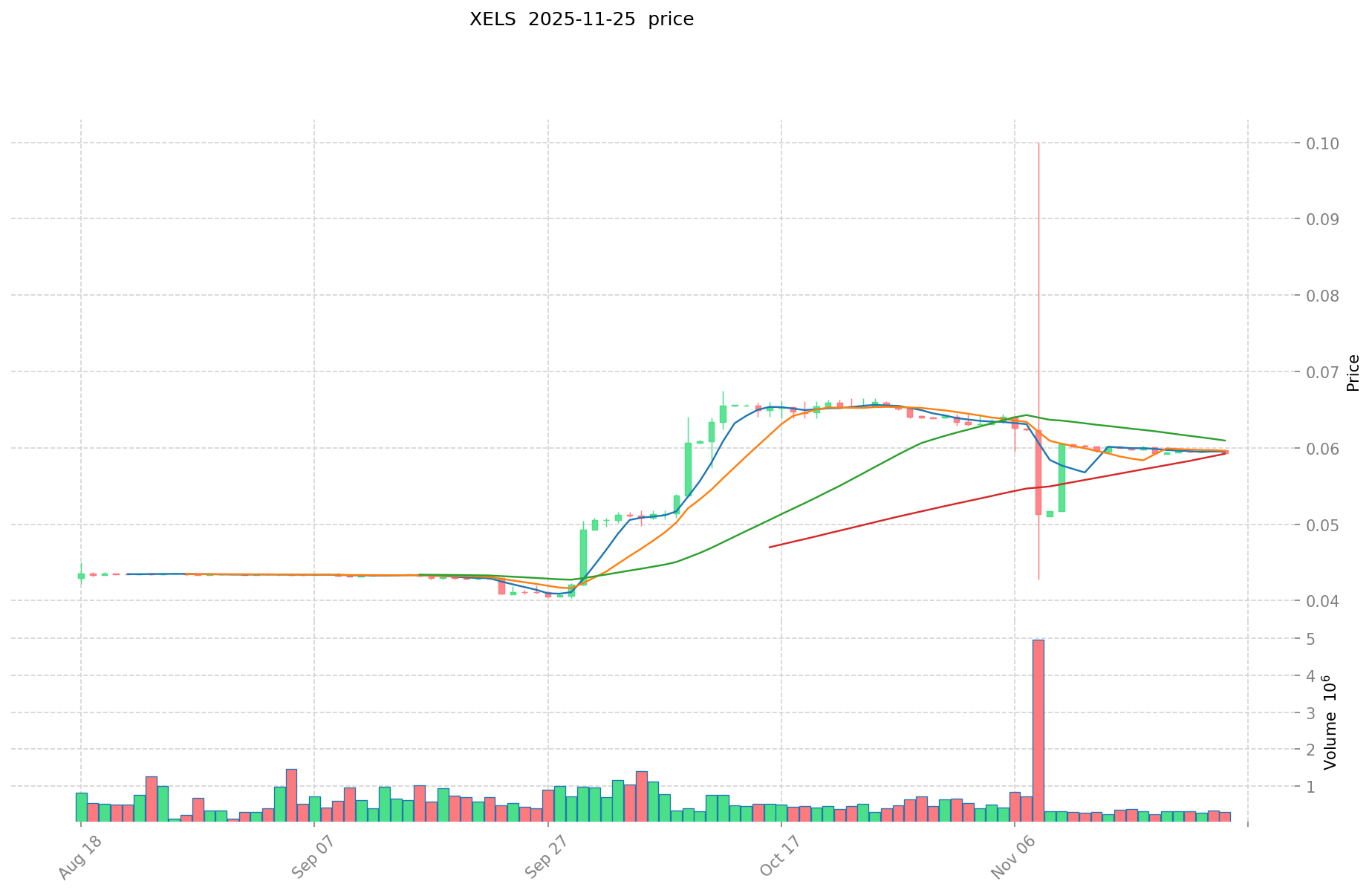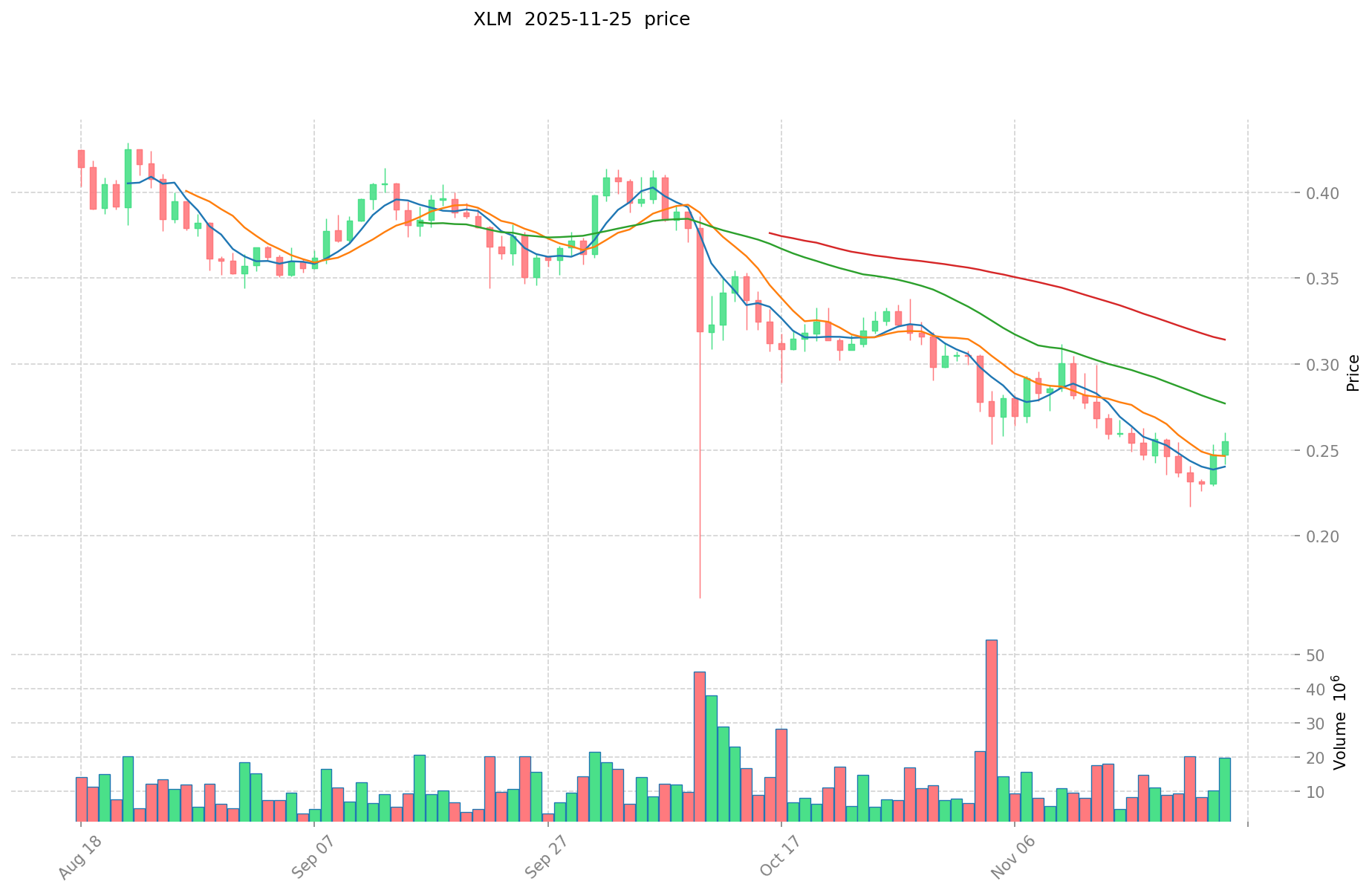XELS vs XLM: Comparing Two Promising Blockchain Solutions for Carbon Credit Trading
Introduction: Investment Comparison of XELS vs XLM
In the cryptocurrency market, the comparison between XELS vs XLM has always been an unavoidable topic for investors. The two not only have significant differences in market cap ranking, application scenarios, and price performance, but also represent different positioning in crypto assets.
XELS (XELS): Since its launch in 2018, it has gained market recognition for its focus on mitigating climate change and promoting sustainable development.
Stellar (XLM): Since its inception in 2014, it has been hailed as a decentralized gateway for transferring digital assets between banks, payment institutions, and individuals, and is one of the cryptocurrencies with the highest global trading volume and market capitalization.
This article will comprehensively analyze the investment value comparison between XELS vs XLM, focusing on historical price trends, supply mechanisms, institutional adoption, technological ecosystems, and future predictions, and attempt to answer the question that investors are most concerned about:
"Which is the better buy right now?"
I. Price History Comparison and Current Market Status
XELS (Coin A) and XLM (Coin B) Historical Price Trends
- 2021: XELS reached its all-time high of $13.95 on December 14, 2021.
- 2018: XLM hit its all-time high of $0.875563 on January 3, 2018.
- Comparative analysis: During market cycles, XELS dropped from its peak of $13.95 to a low of $0.03664388, while XLM declined from $0.875563 to $0.00047612.
Current Market Situation (2025-11-25)
- XELS current price: $0.059296
- XLM current price: $0.24853
- 24-hour trading volume: XELS $8,432.62 vs XLM $4,075,567.12
- Market Sentiment Index (Fear & Greed Index): 20 (Extreme Fear)
Click to view real-time prices:
- Check XELS current price Market Price
- Check XLM current price Market Price


Factors Influencing Investment Value of XELS vs XLM
Market Dynamics
- Market Sentiment: Investor confidence and emotion directly impact cryptocurrency price movements
- Trading Volume: The level of activity in buying and selling affects price stability and liquidity
- Regulatory Environment: Government policies and regulations significantly influence adoption and usage
Technical Innovation and Development
- Transaction Speed: Ability to process transactions quickly affects usability for frequent trading
- Technology Integration: How well the technology merges with existing systems determines adoption rate
- Network Capabilities: The underlying infrastructure's ability to handle demand and scale
Expert Analysis and Market Trends
- Price Predictions: Professional forecasts help guide investment decisions
- Historical Patterns: Past performance provides context for potential future movements
- Market Position: Comparative ranking and competitive advantages within the cryptocurrency space
Practical Applications
- Use Case Development: The practical problems the cryptocurrencies solve
- Ecosystem Growth: The development of surrounding technologies and applications
- User Adoption: The rate at which individuals and organizations embrace the technology
III. 2025-2030 Price Prediction: XELS vs XLM
Short-term Prediction (2025)
- XELS: Conservative $0.03972832 - $0.059296 | Optimistic $0.059296 - $0.0800496
- XLM: Conservative $0.1268115 - $0.24865 | Optimistic $0.24865 - $0.34811
Mid-term Prediction (2027)
- XELS may enter a growth phase, with an estimated price range of $0.04492502144 - $0.11922409536
- XLM may enter a growth phase, with an estimated price range of $0.263559054 - $0.480182934
- Key drivers: Institutional capital inflow, ETF, ecosystem development
Long-term Prediction (2030)
- XELS: Base scenario $0.07026226354732 - $0.125468327763072 | Optimistic scenario $0.125468327763072 - $0.1756556588683
- XLM: Base scenario $0.505963508037108 - $0.5684983236372 | Optimistic scenario $0.5684983236372 - $0.7106229045465
Disclaimer
XELS:
| 年份 | 预测最高价 | 预测平均价格 | 预测最低价 | 涨跌幅 |
|---|---|---|---|---|
| 2025 | 0.0800496 | 0.059296 | 0.03972832 | 0 |
| 2026 | 0.103115744 | 0.0696728 | 0.053648056 | 17 |
| 2027 | 0.11922409536 | 0.086394272 | 0.04492502144 | 45 |
| 2028 | 0.1295395714368 | 0.10280918368 | 0.0627136020448 | 73 |
| 2029 | 0.134762277967744 | 0.1161743775584 | 0.089454270719968 | 95 |
| 2030 | 0.1756556588683 | 0.125468327763072 | 0.07026226354732 | 111 |
XLM:
| 年份 | 预测最高价 | 预测平均价格 | 预测最低价 | 涨跌幅 |
|---|---|---|---|---|
| 2025 | 0.34811 | 0.24865 | 0.1268115 | 0 |
| 2026 | 0.4236996 | 0.29838 | 0.208866 | 20 |
| 2027 | 0.480182934 | 0.3610398 | 0.263559054 | 45 |
| 2028 | 0.49632141306 | 0.420611367 | 0.24816070653 | 69 |
| 2029 | 0.6785302572444 | 0.45846639003 | 0.4263737427279 | 84 |
| 2030 | 0.7106229045465 | 0.5684983236372 | 0.505963508037108 | 128 |
IV. Investment Strategy Comparison: XELS vs XLM
Long-term vs Short-term Investment Strategies
- XELS: Suitable for investors focused on sustainable development and climate change mitigation
- XLM: Suitable for investors interested in decentralized financial infrastructure and cross-border payments
Risk Management and Asset Allocation
- Conservative investors: XELS 20% vs XLM 80%
- Aggressive investors: XELS 40% vs XLM 60%
- Hedging tools: Stablecoin allocation, options, cross-currency portfolios
V. Potential Risk Comparison
Market Risk
- XELS: Lower liquidity and higher volatility due to smaller market cap
- XLM: Exposure to broader cryptocurrency market fluctuations
Technical Risk
- XELS: Scalability, network stability
- XLM: Network congestion during high-volume periods, potential security vulnerabilities
Regulatory Risk
- Global regulatory policies may have differing impacts on both assets, with XLM potentially facing more scrutiny due to its focus on financial transactions
VI. Conclusion: Which Is the Better Buy?
📌 Investment Value Summary:
- XELS advantages: Focus on environmental sustainability, potential for growth in green technology sector
- XLM advantages: Established ecosystem, partnerships with financial institutions, higher liquidity
✅ Investment Advice:
- Novice investors: Consider a higher allocation to XLM due to its established market position and liquidity
- Experienced investors: Balanced portfolio with both XELS and XLM, adjusting based on risk tolerance
- Institutional investors: Strategic allocation to both, with XLM for stability and XELS for exposure to green technology sector
⚠️ Risk Warning: The cryptocurrency market is highly volatile, and this article does not constitute investment advice. None
VII. FAQ
Q1: What are the main differences between XELS and XLM? A: XELS focuses on climate change mitigation and sustainable development, while XLM is positioned as a decentralized gateway for transferring digital assets between financial institutions and individuals. XLM has a larger market cap, higher trading volume, and a more established ecosystem.
Q2: Which cryptocurrency has shown better historical price performance? A: XLM reached its all-time high of $0.875563 in January 2018, while XELS hit its peak of $13.95 in December 2021. However, both have experienced significant drops from their all-time highs, with XELS showing more recent volatility.
Q3: How do the current market situations of XELS and XLM compare? A: As of 2025-11-25, XELS is priced at $0.059296 with a 24-hour trading volume of $8,432.62, while XLM is priced at $0.24853 with a 24-hour trading volume of $4,075,567.12. XLM demonstrates significantly higher liquidity and market activity.
Q4: What are the price predictions for XELS and XLM by 2030? A: For XELS, the base scenario predicts a range of $0.07026226354732 - $0.125468327763072, with an optimistic scenario of up to $0.1756556588683. For XLM, the base scenario predicts $0.505963508037108 - $0.5684983236372, with an optimistic scenario reaching $0.7106229045465.
Q5: How should investors allocate their portfolios between XELS and XLM? A: Conservative investors might consider allocating 20% to XELS and 80% to XLM, while aggressive investors could opt for 40% XELS and 60% XLM. The exact allocation should be based on individual risk tolerance and investment goals.
Q6: What are the primary risks associated with investing in XELS and XLM? A: XELS faces risks related to lower liquidity, higher volatility, and potential scalability issues. XLM is exposed to broader cryptocurrency market fluctuations, potential network congestion, and may face more regulatory scrutiny due to its focus on financial transactions.
Q7: Which cryptocurrency might be better suited for different types of investors? A: Novice investors might consider a higher allocation to XLM due to its established market position and liquidity. Experienced investors could balance their portfolio with both XELS and XLM. Institutional investors might strategically allocate to both, using XLM for stability and XELS for exposure to the green technology sector.
Share
Content